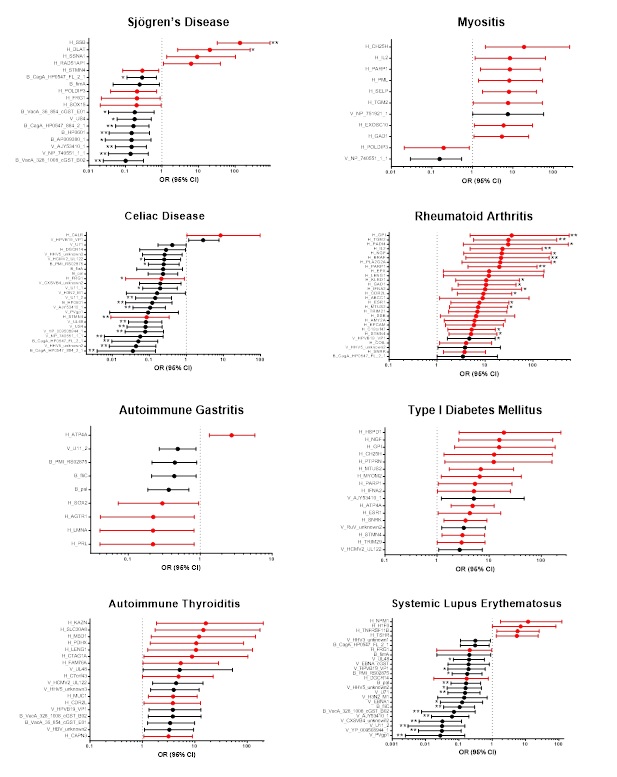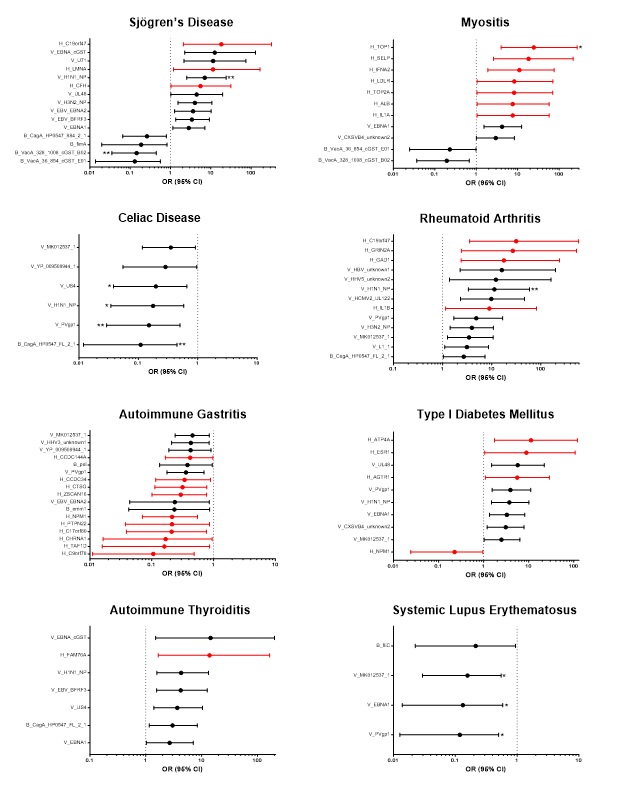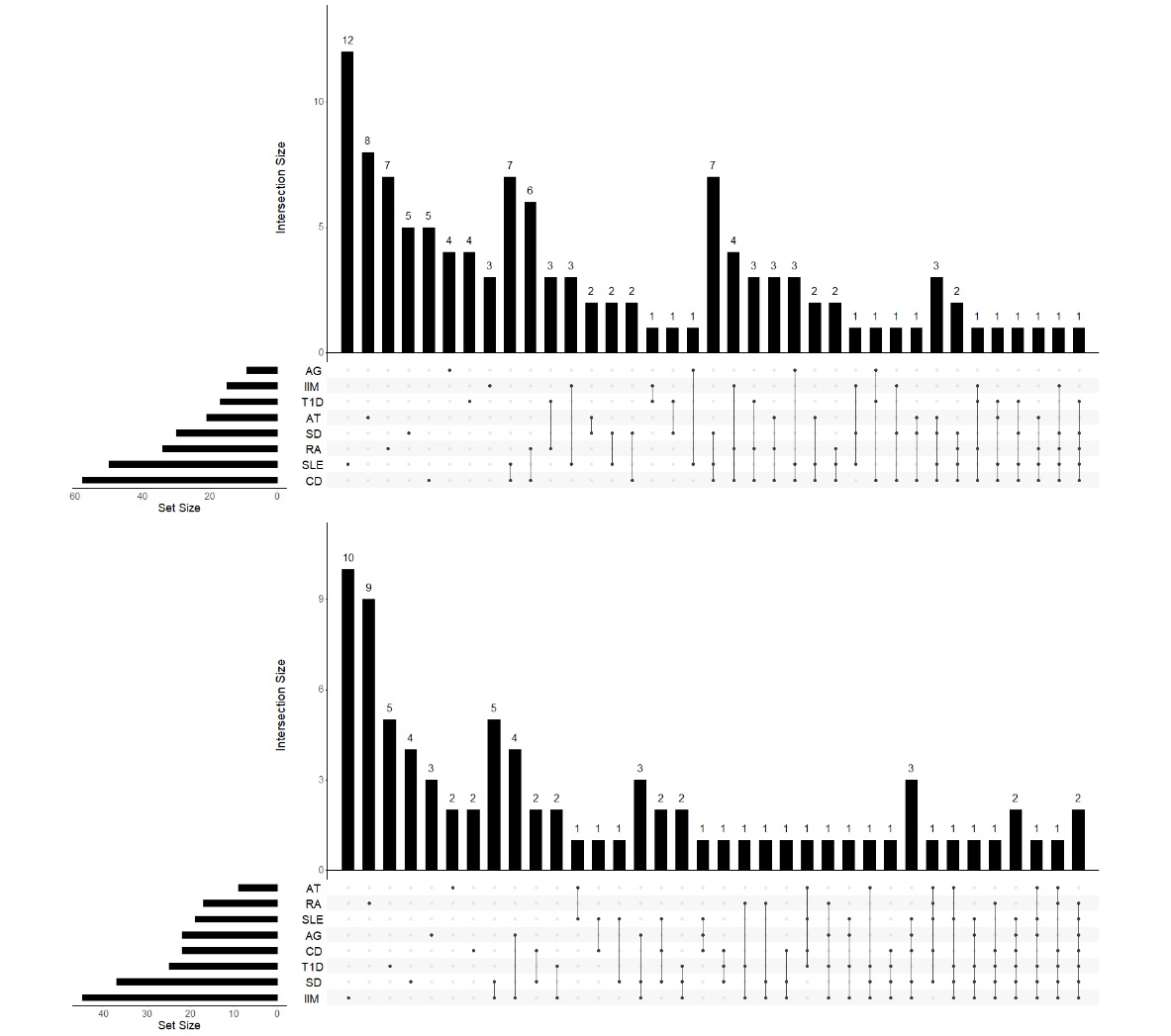Session Information
Session Type: Poster Session A
Session Time: 10:30AM-12:30PM
Background/Purpose: Prior research has investigated a limited range of candidate markers within individual autoimmune diseases. This study aimed to identify specific and common autoantibodies and antibodies to infectious agents associated with various autoimmune diseases using an extensive antibody immunoproteomics array.
Methods: Serum samples were collected from 256 patients (67% females; 55 mean age) diagnosed with autoimmune diseases, including autoimmune gastritis (AG; n=102), autoimmune thyroiditis (AT; 20), celiac disease (CD; 25), myositis (IIM; 18), type 1 diabetes mellitus (T1D; 24), rheumatoid arthritis (RA; 20), Sjögren’s disease (SD; 25), and systemic lupus erythematosus (SLE; 22), and were compared to sera from 112 controls without autoimmune diseases. We utilized the Nucleic-Acid Programmable Protein Array platform for measuring antibodies targeting 280 human, 40 viral, and 15 bacterial antigens. The univariate association between each antibody seropositivity and each autoimmune disease was assessed using Firth logistic regression. Multivariable modeling methods, specifically LASSO and random forest, were applied to consider inter-relationships among antibodies. All models were adjusted by age and sex. We identified candidate markers for these autoimmune diseases by combining results from univariable and multivariable analyses, defining a marker as significant if it was identified by either approach.
Results: Of 340 antibodies measured, there was a median of 14.5 (AT) to 38 (T1D) IgG antibodies and 3.5 (SLE) to 16 (RA) IgA antibodies detected, compared to 35 IgG and 12 IgA antibodies in the controls. In the univariable analysis, most autoantibodies to human proteins were positively associated with autoimmune diseases (OR range 2.73-135.82), while antibodies to infection generally showed inverse associations (OR range 0.03-0.51). Finally, we were able to identify a range of disease-specific antibodies from 3 (IIM) to 12 (SLE) for IgG, and from 2 (CD, AT) to 10 (IIM) for IgA. Thirty-nine IgG and thirty IgA antibodies overlapped across 3 or more diseases. Two IgG autoantibodies overlapped in up to 5 diseases (Stathmin Like 4: SLE, SD, T1D, CD, RA; Tripartite Motif-Containing 21: SLE, SD, IIM, CD, RA), and two IgA antibodies (Coxsackievirus B3, Enterovirus C) were identified as significant markers in up to 7 diseases (IIM, SD, T1D, CD, AG, SLE, RA). We confirmed several antibodies, some of which are already used clinically as diagnostic markers, which include antibodies to Sjögren syndrome type B for SD and ATPase H+/K+ transporting subunit alpha for AG.
Conclusion: The inverse associations observed between antibodies against infectious agents and autoimmune disease suggest potential pathogenic mechanisms such as inefficient antibody production, and/or the effects of immunosuppressive medications. Additionally, the identification of common antibodies linked to multiple autoimmune diseases hints at shared pathways or mechanisms underlying concurrent illnesses. Our findings using a novel antibody screening platform reinforce the clinical relevance of some of these markers and provide a new tool to discover insights into the etiology of autoimmune diseases.
Red: autoantibodies, Black: antibodies against bacteria and viruses;
*Benjamini-Hochberg **Bonferroni Correction
Red: autoantibodies, Black: antibodies against bacteria and viruses;
*Benjamini-Hochberg **Bonferroni Correction
To cite this abstract in AMA style:
Yun C, Qiu J, Camargo M, Song L, LaBaer J, Hong H, Engels E, Edie-Booker M, Schiffenbauer A, Rider L, Miller F, Hasni S, Warner B, Leja M, Song M. Immunoproteomic Profiling of Antibodies in Autoimmune Diseases [abstract]. Arthritis Rheumatol. 2024; 76 (suppl 9). https://acrabstracts.org/abstract/immunoproteomic-profiling-of-antibodies-in-autoimmune-diseases/. Accessed .« Back to ACR Convergence 2024
ACR Meeting Abstracts - https://acrabstracts.org/abstract/immunoproteomic-profiling-of-antibodies-in-autoimmune-diseases/



